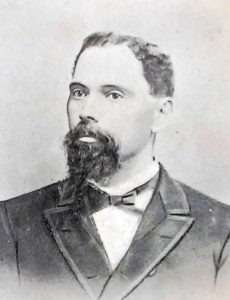The History of Slavery at UGA
- Location: Athens-Clarke County, Georgia
- Director: Chana Kai Lee (History)
- Schedule: Fall 2020-Spring 2021
 Enslaved near Columbus, Georgia, Lucius Henry Holsey (1842-1920) arrived in Athens not by choice. His enslaver and newly hired Franklin College English professor, Richard Malcom Johnston, brought Holsey to Clarke County in 1858. For seven years, Holsey served as Johnston’s carriage driver, house servant, and gardener. It is hard to imagine what it meant to live, work, pray, and love among a literate, educated people who denied his right to grow by closing off his access to the same books and classes which inspired their dreams. “As soon as I arrived in Athens,” Holsey later wrote, “I felt an insatiable craving for some knowledge of books…. [But] what must I do? I was a slave and could not attend school, and it was considered unwise, if not dangerous for slaves to read and write.”
Enslaved near Columbus, Georgia, Lucius Henry Holsey (1842-1920) arrived in Athens not by choice. His enslaver and newly hired Franklin College English professor, Richard Malcom Johnston, brought Holsey to Clarke County in 1858. For seven years, Holsey served as Johnston’s carriage driver, house servant, and gardener. It is hard to imagine what it meant to live, work, pray, and love among a literate, educated people who denied his right to grow by closing off his access to the same books and classes which inspired their dreams. “As soon as I arrived in Athens,” Holsey later wrote, “I felt an insatiable craving for some knowledge of books…. [But] what must I do? I was a slave and could not attend school, and it was considered unwise, if not dangerous for slaves to read and write.”
Many other black Athenians like Holsey, who comprised over half of the town’s population, built and maintained the University of Georgia (originally called Franklin College), from the institution’s founding in 1785 through its temporary closure during the U.S. Civil War. UGA’s daily operations depended largely on these uncompensated laborers. Enslaved persons named Sophia, Wilson, Louisa, Caroline, Billy, Elvir, Patrick, and Dick built, cleaned, and repaired buildings, dug wells, tended campus gardens, and performed other duties. University presidents and professors put them to work on campus, where they also served students by hauling water, washing clothing, cleaning shoes and boots, and caring for horses and other animals. But they were their own inventions. They shaped communities and culture in a system designed to efface their histories and mute their voices.
The History of Slavery at UGA Project (HSUGA) is a multidisciplinary, community-centered project that seeks to uncover stories of the enslaved African Americans who labored on this campus from its founding to 1865. Faculty and student researchers will collaborate in analyzing a large and varied collection of primary sources related to the history of slavery at UGA. We will begin with a methodical review of sources in the University archives: the Centennial Alumni Catalog, 1901; the Prudential Committee Minutes; the UGA Literary Societies Collections; Board of Trustees Minutes Correspondence and Reports, Senatus Academicus Minutes; and Faculty Minutes.
In addition to our systematic review of university records, our team will retrieve and study the typical public sources that researchers use to write histories of slavery: population census schedules, tax records, estate inventories, property deeds, bills of sale, and miscellaneous court records. Based on these sources, we will attempt to document a history of ownership, profits, and institutional expansion that we have yet to appreciate. We will examine also the few published narrative accounts written by formerly enslaved men and women that mention Athens and the enslaved community’s relationship to the University, particularly as the war approached.
The University of Georgia Libraries’ On These Grounds: Slavery and the University of Georgia digital resource is now available. This project was supported by Chana Kai Lee, associate professor of history and African American studies; Scott Nesbit, associate professor of digital humanities in the College of Environment and Design; and the Willson Center Digital Humanities Lab.
